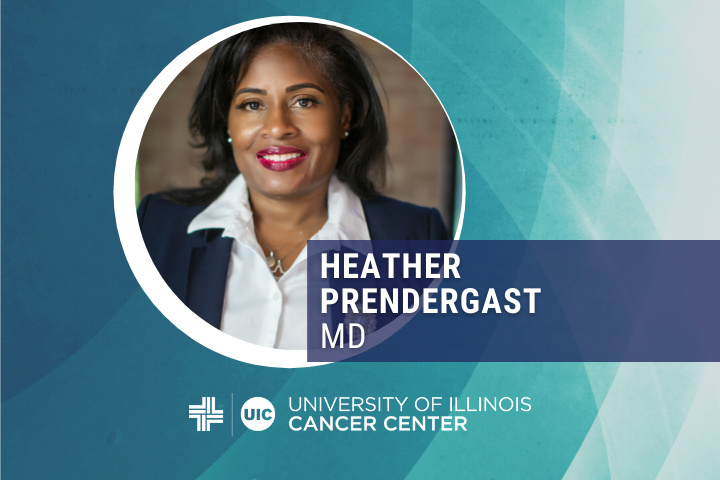
University of Illinois Cancer Center member Dr. Heather Prendergast is a physician-scientist specializing in emergency medicine at UI Health. Her research focuses on minority health and associated health disparities.
Quote
“I have always been interested in science and scientific investigation, and have been fortunate to combine my love of emergency medicine with my passion for health equity.”
How do hospital emergency departments play a role in cancer treatment?
We serve high-risk cancer patients that are either lost in the transition between care environments and eventually seek periodic care in the emergency department. Many of these patients don’t have a medical home and use the emergency department as a primary care facility.
Studies have demonstrated poorer outcomes among these patients. Health disparities in cancer survivorship have persisted despite significant improvements in early detection and treatment over the past several decades. Significant challenges and gaps remain in navigating transitions between acute care and outpatient care for many cancer survivors.
What research are you currently conducting and have undertaken in the past?
I currently serve as principal investigator on a project whose goal is to improve outcomes in cancer patients by lessening the risk of complications. The study – Improving Cancer Survival and Reducing Treatment Variations with Protocols for Emergency Care (ICARE) – is funded by the Centers for Disease Control and Prevention (CDC), through the National Center for Chronic Disease Prevention and Health Promotion Special Emphasis Panel.
In the study, we apply evidence-based screening protocols in the emergency department while improving access to specialist cancer care through well-coordinated cancer care plans. There is increasing data suggesting that emergency department care coordination and treatment protocols are associated with better outcomes among cancer patients. Through the use of cancer navigators placed in the emergency department and the establishment of a new UI Health Cancer Survivorship clinic, ICARE will develop a model of care that will be portable to other emergency departments, improving the quality of life and overall care for survivors. There is so much opportunity to impact cancer patients now and in the future, and ICARE is just a start.
The project will use existing partnerships with the Cancer Center, as well as Mile Square Health Center and the Clinical Decision Unit in UI Health’s emergency department. Data will be shared through the Electronic Medical record and EPIC care plans.
ICARE is among 15 grants I have been fortunate to receive. The majority of my work has been funded by the National Institutes of Health (NIH), the Centers for Disease Control and Prevention (CDC), and the University of Illinois Center for Clinical & Translational Science (CCTS), as well as other various governmental agencies and foundations. I have also published 32 research papers and contributed 23 book chapters.
Have you focused on disease states other than cancer?
Early in my academic career, I focused more exclusively on cardiovascular disparities, specifically heart disease and heart failure. For more than a decade, heart failure has remained a leading cause of admissions and readmissions to the emergency department and inpatient hospitalizations. During this time, I observed a disturbing trend that the age of our heart failure patients was getting younger and younger.
We would routinely see 45-year-old patients presenting with new onset heart failure or kidney failure that required dialysis. This trend was particularly disturbing given the advances in the management of heart failure.
It became clear to me that focusing on improving access to care for emergency department patients offered the best opportunity for favorable results for many of the health disparities witnessed within the emergency department.
Bachelor’s Degree
University of Illinois Urbana-Champaign
Major: Chemistry
Medical Degree
University of Illinois Chicago College of Medicine
Postdoctoral/Residency
University of Maryland Medical Center, Baltimore
Faculty member since June 1998
